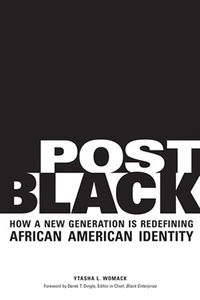It’s exciting that more people are noticing the cultural shift that I’ve been talking about–and this  community has, in some ways, been driving–for the last three years. Case in point is author Ytasha Womack, whose new book, Post Black: How A New Generation Is Redefining African American Identity, examines that broad cultural forces that are making it possible for black rock music, among other things, to gain more momentum in American society.
community has, in some ways, been driving–for the last three years. Case in point is author Ytasha Womack, whose new book, Post Black: How A New Generation Is Redefining African American Identity, examines that broad cultural forces that are making it possible for black rock music, among other things, to gain more momentum in American society.
While I wasn’t interviewed for the book, I did join Ytasha by phone to talk about black rock. I’m reading her book now and will return the favor with an interview with her on this blog in a few weeks. In the meantime, here’s an excerpt of our conversation:
YTASHA L. WOMACK: Why do you believe there is a new wave of black rock bands?
RF: I just think that what we are beginning to see is that people, particularly black folks are reaching beyond the narrow bounds of black life that we had been relegated to in greater numbers than before. You always had people in the fringe, people who were into rock or punk. But one of the beautiful things about technology is that it has allowed people of like minded interests to find one another. There are a lot of people out here who are into punk or rock and aren’t into the paradigm of commercial hip hop or the r & b lover kind of thing. There is so much more to life than that.
YLW: The flourishing black rock scene is a cultural statement?
RF: It’s a really exciting time. Black rock isn’t about black kids picking up guitars, but rather an invitation to be brave and to question what we do, how we express ourselves and what we think of as traditionally black. Those are important things to look at if we are going to be citizens of the world. We have to be open to ideas, new people, and embrace diverse influences. It puts us in touch with our humanity. That is what black rock offers.
YLW: Is the rise of black rock also a way of challenging hip hop as the primary expression of black youth culture?
RF: Black folks aren’t all thinking about the hip hop paradigm in terms of the way it presents masculinity or the way it presents black authenticity. There are a whole lot of black identities out there. We’ve always known that. We’ve never been this monolith. We have more ideas about what black is and you are broadening that definition with the Post Black concept at a time when we need. it. The world has gone global and we’re still trying to rep our hood and our block. That’s not even the game anymore.
YLW: Why did you create BoldAsLove.com
RF: I started it 3 years ago. I felt a cultural shift happening. With black rock, black people were exploring the musical spectrum. (Black rock) was moving off the fringes. It’s in the mainstream. You have Passing Strange on Broadway, Farai Chideya did a novel called Kiss the Sky about a black woman who has a rock band. Artists like Janelle Monet and others aren’t fitting neatly into what’s black. It’s happening in London, too. President Obama is the example of what you’re talking about with Post Black. We can’t be Post Black until people stop being racist, but Obama is a sense of this larger world. It ‘s happening in music, in art. It’s all this post blackness. I interviewed an African American artist recently and she said her favorite artist was Led Zepplin. Back in the day you would never say that.
Additional links:
- Buy Post Black from Amazon
- Visit the Post Black blog
Do you like what you’ve seen on this blog over the last three years? If so, consider making a small donation–$1, $5, $10–whatever you can. Here’s why I’m asking and how you can donate.
